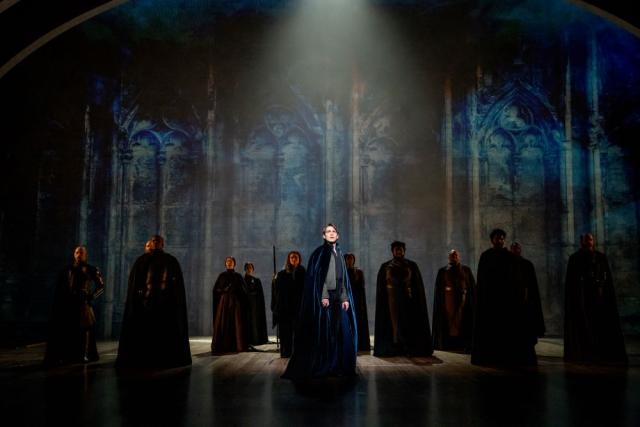


Camelot, the musical adaptation of the legend of King Arthur and the Knights of the Round Table, has always been a “problem” show. Alan Jay Lerner and Frederick Loewe’s lush, romantic score which includes such evergreen standards as “If Ever I Would Leave You,” “How to Handle a Woman,” and the optimistic title tribute to an idealized socially just society, has been overshadowed by Lerner’s confusing and diffuse book. After receiving mixed reviews, the 1960 tuner was saved from an early closing by an appearance on the “Ed Sullivan Show” by its stars Richard Burton and Julie Andrews. Joshua Logan’s bloated 1967 film adaptation didn’t help.
Since then, the show’s reputation has been enhanced by its fabled association with the Kennedy administration and as a vehicle for elder acting statesman such as Burton, Richard Harris (who starred in the film), and Robert Goulet (the original Lancelot graduating to King Arthur) to have a late-career hurrah.
News of a new Lincoln Center Theater revival (the fourth Broadway edition) with a revised book by Aaron Sorkin (“The West Wing”) and direction by Bartlett Sher who breathed new life into such familiar classics as South Pacific, The King and I and My Fair Lady in previous LCT productions, was greeted with trepidatious optimism. Perhaps the new book could match the timeless score. The good news is the songs are as lovely as ever, thanks to the lush original orchestrations by Robert Russell Bennett and Philip J. Lang under the sensitive music direction of Kimberly Grigsby and the stunning vocals by Andrew Burnap (Arthur), Phillipa Soo (Guenevere), and especially Jordan Donicas’s thrilling baritone as Lancelot. The bad news is Sorkin’s revisions have not improved the original’s shortcomings and only introduced new ones.
Lerner’s original was too episodic, wandering in several different directions and introducing a villain (Mordred, Arthur’s bastard son) and plot twist late in the second act (Mordred’s plan to destroy his dad’s egalitarian dream), draining focus from the main action of the romantic triangle between the three leads. Sorkin attempts to tidy up Lerner’s loose ends, remove the magical elements, and inject a “woke” 2023 sensibility into the proceedings. The latter didn’t work for me when Sorkin updated To Kill a Mockingbird, and it doesn’t work in Camelot. The lack of mysticism makes for a dry and dull evening, reinforced by Michael Yeargen’s simplistic sets (wrought-iron gates sliding in and out) and Jennifer Moeller’s dark costumes (the only color we get is during “The Lusty Month of May” sequence.) Several of the songs such as “What Do the Simple Folks Do?” are switched from light fun to dour lectures.
In this new edition, Guenevere is driven into Lancelot’s arms not because of their uncontrolled passion, but because Arthur insensitively calls his wife his “business partner” and “friend.” The lack of chemistry between the three points of the triangle further blurs the romance’s impact.
Guenevere is now a feisty feminist who mocks the cherished title tune as “that dumb song about the weather” and Arthur is an indecisive wimp. Only Lancelot remains untouched by these contemporary interpolations and that’s why the dynamic Donica becomes the centre of the show. For some reason, he has been given Guenevere’s “I Loved You Once in Silence,” and it’s an island of sweet charm in a sea of confusion.
In another bizarre update and draining of magic, Arthur’s former love Morgan Le Fey (a waspish Marilee Talkington) is transformed from an enchantress to an alcoholic scientist (a term that didn’t even come into usage until 1833). Rather than trap Arthur behind a magic wall to separate him from Guenevere as in the original, she talks him to death with her visions of the future. (Maybe she’s a Time Lord escaped from a “Doctor Who” episode?) Sorkin further confuses matters by cinematically intercutting this sequence with the knights rebelling against the new equitable order (“Fie on Goodness”) with Mordred cheering them on and Lancelot and Guinevere finally consummating their forbidden love. As usual, Sher’s staging is clean and focused, but he cannot make up for the muddle of the book.
Aside from the glorious songs, Dakin Matthews provides much needed comic relief in the dual role of Merlin, Arthur’s magical advisor, and King Pellinore, a sort of medieval Colonel Pickering to Arthur’s Henry Higgins. Taylor Trensch could have been deliciously evil as Mordred but comes across as only obnoxious. Similarly, this Camelot could have been a revitalization of a beloved, but flawed classic, but what we got is a “woke” sermon.
